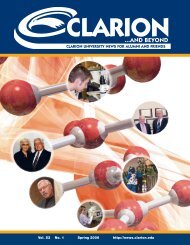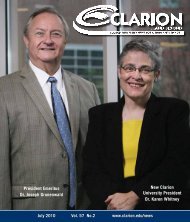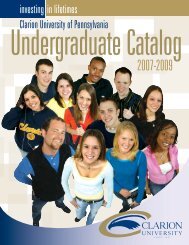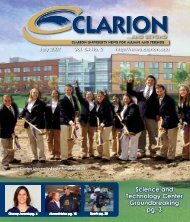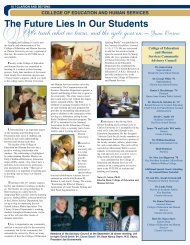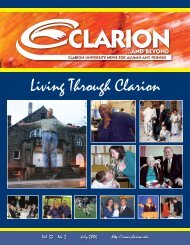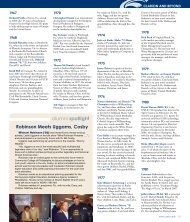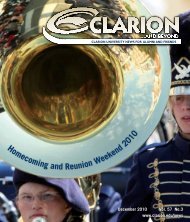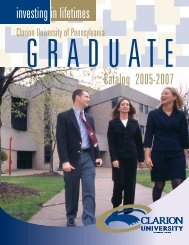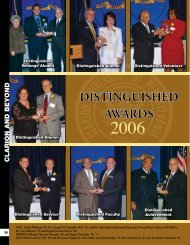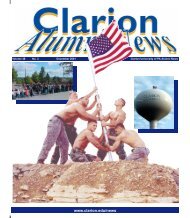Graduate - Clarion University
Graduate - Clarion University
Graduate - Clarion University
- No tags were found...
You also want an ePaper? Increase the reach of your titles
YUMPU automatically turns print PDFs into web optimized ePapers that Google loves.
<strong>Clarion</strong> <strong>University</strong> of Pennsylvania 43course will provide in-service teachers with the knowledge base to make appropriate decisions regarding the use of technologyin their respective classrooms. Not available to students who have taken ED 217 since summer 1994.ED 520: Introduction to Research 3 s.h.This seminar course covers the selection, investigation, and writing of a research topic. Students are introduced to theplanning of research projects, major methods of obtaining data, descriptive statistics, statistical inferences, methods of analysisand critical evaluation of published research, and the preparation of written reports. Proposed research problems and proceduresare prepared for discussion and critical analysis. Offered each semester and summer.ED 521: Instructional Leadership Skills 3 s.h.Involves a survey of various theories, models, and styles of leadership, followed by the application of leadership skills inteacher-pupil and teacher-colleague relationships.ED 522: Analysis of Teaching 3 s.h.Presents an analysis of various teaching models and instructional designs. Lessons and clinical field experiences applyingcourse competencies are critiqued by peers and faculty so as to expand the teaching repertoire of classroom teachers. Offeredfall semester only.ED 523: Curriculum Development and Evaluation 3 s.h.Presents philosophic, psychological, and social foundations of the school curriculum as well as principles of curriculumdevelopment, curriculum design, curriculum implementation, and curriculum evaluation with an emphasis on K-12 models.A range of views both historical and current is presented along with curriculum issues, trends, and future directions. Ideologicbiases from traditional to pragmatic and postmodern are considered across major time frames for the 20 th century and early21 st century. Offered spring semester only.ED 524: Foundations in Education 3 s.h.By exploring the social realities and challenges confronting today’s diverse classrooms and the teaching profession, thiscourse introduces pre-service teacher candidates to the foundations of education through an examination of the historical,philosophical, and social context of American education as well as the cognitive, psychological, and social-emotionalperspectives of the classroom in a multicultural society. By exploring the actuality of career commitment to the teachingprofession, the course prepares pre-service teacher candidates for their role in today’s diverse classrooms with the essentialknowledge, skills, and disposition necessary to become reflective practitioners. Prerequisite: Pass Praxis I.ED 526: Sociology of Education 3 s.h.This course is an analysis of the public school as an institution in modern societies and its operation in complex socialstructures. The course draws upon the science of sociology and other social fields to explain the operation of the school as one of thesocial systems which operate to influence the development of people in becoming efficient and cooperative members of society.ED 530:Connecting Standards, Instruction, and Assessment: Designing andimplementing Authentic Assessment in the World of Standards3 s.h.Provides educators with a brief review of the purpose and process of assessment and to introduce them to design optionsavailable in designing and implementing authentic assessment. Students acquire, synthesize, interpret and discuss a range oftopics dealing with assessment in the educational process. Emphasizes a backward design process for curriculum developmentthat links standards, curriculum, instruction, and embedded assessment. Students construct and evaluate a variety of assessmenttools with a particular emphasis on authentic assessment. Every other year and/or as needed.ED 531: Teaching Secondary Social Studies 3 s.h.Prepares social studies candidates for teaching diverse learners in a secondary setting through field-based experiences;emphasizes critical pedagogical methods, strategies, and research-based best practices to make social studies contentcomprehensive to secondary students; expands on models of differentiated instructional design, effective interdisciplinaryplanning, and technology integration to teach content; builds a repertoire of teaching strategies to enhance students’ diverselearning in the secondary classroom; emphasizes NCSS essential skills for social studies and disciplinary standards for history,geography, civics, government, economics, and behavioral sciences. Prerequisites: Completion of the five required coursesin the <strong>Graduate</strong> Secondary Teacher Certification Program (15 s.h.)ED 532: Teaching Secondary Science for Understanding 3 s.h.Prepares post-baccalaureate candidates to teach the sciences in secondary schools. Emphasizes teaching science forunderstanding and application of science knowledge. Includes basic curriculum design-formulating goals and objectives,selecting and organizing content, developing skill in using a variety of teaching strategies, and evaluating pupil progress.Stresses the inquiry approach to teaching science. Includes observations and teaching experiences in schools. Prerequisite:ED 534, SPED 418. Fall/Spring as needed.ED 533: Recent Developments in Elementary Social Studies 3 s.h.Students explore recent trends in promoting learning in the social studies as well as study current problems involved.Social forces at work today and their effect on curriculum development are considered.ED 534: Workshop in Education 3 s.h.Provides opportunities for in-service teachers to encounter new ideas, knowledge, and methods in meeting problems intoday’s schools. Prerequisite: Teaching experience in the elementary or secondary schools.ED 537: Strategies and Problems of Teaching Elementary School Mathematics 3 s.h.Deals with recent trends and methods of teaching mathematical concepts and skills appropriate to the elementary gradelevel. Particular attention is given to diagnostic procedures and to a “hands-on” laboratory approach. Classes are conducted in awell-equipped elementary mathematics laboratory. Recent research which applies to the teaching and learning of mathematicalskills and concepts is considered.Education/Reading/Science Education



